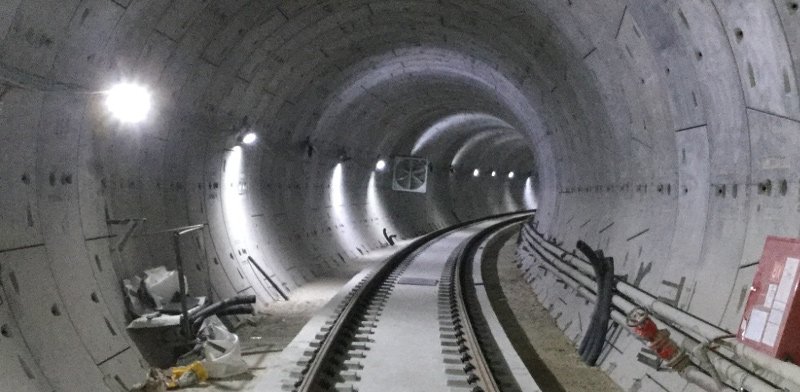Israel National Infrastructures Commission has approved the M2 east-west Metro Line. The M2 line will be 26 kilometers long extending through nine local authorities with 22 stations from Petah Tikva's Segula industrial Zone in the east via Givat Shmuel and via Bnei Brak, Givatayim and Central Tel Aviv to Holon near Wolfson Hospital.
The Bnei Brak Municipality objects to tunneling work on Shabbat on the section of the line beneath Hazon Ish and Kahanaman Streets, so an alternative route has been proposed beneath Ramat Gan, which is less suitable in terms of optimal transportation needs.
As part of the planning procedures, an agreement was reached with Bnei Brak Municipality in which tunneling would continue 24/7, because stopping the tunnel boring machine (TBM) can be dangerous. This was also the case during tunneling of the light rail Red Line under Bnei Brak.
However, Bnei Brak municipality denies that any agreement has been reached to allow tunneling on Saturdays and holidays and claims that a clause was introduced that allows work only in regard to supervision. However, sources familiar with the project explain that the TBM machine digs and reinforces the tunnel walls at the same time, and therefore stopping it on Shabbat could jeopardize life.
How will Habimah Square look?
The investigator who examined the objections also expressed her position on the station being built beneath Habimah Square in Tel Aviv, because construction requires uprooting valuable ficus trees and damage to the square, designed By Israel Prize winning artist Dani Karavan. The station, which will serve 45,000 passengers daily will be downsized, the number of ficus trees uprooted reduced from 10 to 4, and the iconic "Elevation" sculpture by Menashe Kadishman will remain.
The metro system consists of three lines divided into five plans. The National Infrastructure Commission has now approved four plans of the five plans, and the metro system has almost entirely approved from a planning point of view. Previously the M3 line and the southern and central parts of the M1 line were approved.
The final plan requiring approval is the northern part of the M1 line, which includes two branches that leave Gillot to Ra'anana and to Kfar Saba, with both municipalities and activist groups in them opposing the location of the depot in Kfar Saba and the metro route in Ra'anana.
NIS 2.4 billion to be released
Meanwhile, the Metro continues to move forward in terms of implementation as well. Minister of Transport Miri Regev has removed her opposition to promoting the metro by diverting NIS 2.4 billion from her ministry's budget to promote railways to Kiryat Shmona and Eilat (for which tens of billions of NIS are needed for construction).
It also seems that an agreement is being reached in which NTA, which oversaw the completion of the light rail Red Line, after years of delays, will manage the work on the Metro, while certain sections of the project will be carried out by the Netivei Israel National Transport Infrastructures Co., following Regev's demands that the company implement the project.
Following the transfer of funds, Regev has begun signing the necessary expropriation orders near the approved Metro stations, and the committee to locate a person to head the Metro Authority has begun functioning after almost a year's freeze in activities, although it is not clear how many of the candidates are still interested in the job.
NTA also published the results of the tender for the management and planning of the Metro lines, worth an estimated NIS 8-10 billion. According to the plan by 2024, there will be about 300 people on each line, working on detailed planning and management of the project and its stages.
The part that is still significantly delayed is the passage of the Metro Law, which was supposed to be passed within one Knesset session after the current Knesset was sworn in, but is being promoted slowly. In an interview with Globes, NTA chair Maya Liquornik warned that failure to pass the law will slow progress of the project.
Bnei Brak Municipality said, "Bnei Brak Municipality denies the completely incorrect report! The opposite is true. Work on the Metro will be carried out only on weekdays as was clearly agreed upon in the conditions of the permit and specifically stated. In the said agreement approved by the city council and in the opinion of the Lithuanian rabbis in the city, a clause was inserted referring monitoring of life endangering that may occur in the tunneling areas, and emergency actions required to prevent life endangering monitoring, and only this activity was allowed and conditioned under the supervision of the city's rabbis. The issue appears clearly in the agreement that was brought to the city council and was overwhelmingly approved by the council members. It will be emphasized again: contrary to the report, no work on Shabbat was approved and no work will be carried out on Shabbat."
Related News

